Under the slogan "Hours of Waiting to Fill Your Tank," a group of revolutionaries from October 17 launched "Stations of Dignity," a symbolic movement expressing the situation at gas stations in Lebanon. This took place at key intersections in the capital, Beirut, which are named after the October 17 Revolution that erupted in 2019. Models resembling gas stations were set up from cardboard at the Ring Bridge intersection in the heart of Beirut.
According to the activists, the aim of this movement is "to provide citizens' cars with the dignity they have lost at the real stations." These queues have affected everyone, including doctors, military and media personnel, taxi drivers, and others, forcing them to wait in lines dubbed by Lebanese people as "queues of humiliation," referring to the demeaning experience faced by people these days while trying to obtain minimal amounts of gasoline, which might allow them to reach their workplaces.
At the Ring Bridge, traffic suddenly congested, and cardboard stations settled in the middle of the intersection in an unprecedented spontaneous protest. One of the organizers of these cardboard stations, equipped with plastic hoses, told "Sky News Arabia": "Today, we raised the hoses of dignity in the face of humiliation." He added, "Through this movement, which will increase and move to other areas, we want to say that we do not need dignity; they do, referring to the politicians."
He continued: "We are fed up with humiliation and degradation at the gas station queues; here we will sprinkle drops of dignity on passing cars as a message to the concerned officials to resign." A girl at another gas station participating in the movement said to "Sky News Arabia": "These stations embody our pain in reality. We raise the banner of dignity because the Lebanese have not gotten used to humiliation."
Some passersby smiled in surprise at the protest, with a taxi driver telling "Sky News Arabia": "This is a rightful movement; perhaps it will send a message to everyone, including station owners who participated with officials in our humiliation by hoarding fuel in anticipation of price increases."
In another part of the capital, amid deteriorating economic and living conditions, and the continuous rise in the exchange rate of the dollar in the black market, as well as the shortage of most medicines in pharmacies, queues of humiliation formed at gas stations. In protest against the general conditions prevailing in the country, a number of protesters cut off the Qasqas road connecting the capital to its suburbs, while the road was blocked at the Kornish Al-Mazraa in front of Abdel Nasser Mosque, the main artery for traffic in Beirut.




